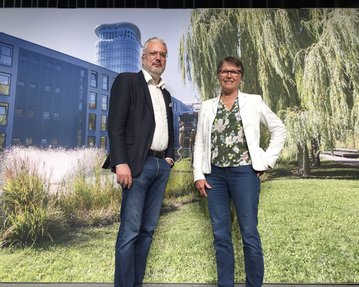
While the funding through the Erasmus+ programme "Key Action 107" will end this year, Prof. Zoran Jeličić from Serbia has now come to Heidelberg once again as a visiting professor.
While the funding through the Erasmus+ programme "Key Action 107" will end this year, Prof. Zoran Jeličić from Serbia has now come to Heidelberg once again as a visiting professor.
He was the first visiting professor to visit us in Heidelberg for a fortnight since the outbreak of the pandemic. A reason to ask him about his experiences and plans and to take a look back at the program KA 107.
Since 2015, the Erasmus+ project of the SRH University of Heidelberg with the University of Novi Sad in Serbia has received funding from the EU and the DAAD. Thus, a total of around 260,000 euros in funding was realised. It is a successful model, which Prof. Dr. Achim Gottscheber of the School of Engineering and Architecture is particularly committed to and which has meanwhile recorded many satisfied participants and a lively exchange of in- and outgoings: Since 2015, 23 students from Novi Sad have come to our university in the Master's degree programmes in IT and Architecture and in the Bachelor's degree programme in Business Administration, and 19 have travelled to Serbia. 27 lecturers were guests in Heidelberg, while seven lecturers taught or had a training in Novi Sad (Deutsch: Sieben Lehrende lehrten oder waren zur Weiterbildung in Novi Sad). The mobility program KA107 for partner countries was enabling to enhance also the common research field in robotics between Prof. Dr Achim Gottscheber (Heidelberg) and Prof. Dr Branislav Borovac (Novi Sad).
Benefit for students and professors
Gottscheber reports: "Not only the students benefit from the Erasmus-funded exchange in research and teaching, but also the professors, who were able to discuss research content in addition to their guest lectures." Since 2021, Serbia is considered a normal EU Erasmus programme country, so that the cooperation with the University of Novi Sad can be continued under new conditions.
Exchange shaped by Corona
The exchange coincided with an eventful time, which was very much shaped by Corona at the end. For example, four students from the Information Technology Master's programme were stranded in Novi Sad in 2020 when they were writing their Master's thesis there: For months they were stuck in Serbia. So report Sanjay Raju Sudarshana Raju, Sarath Nandagopal Rajini, Molugu Surya Virat, and Krishna Teja Gadiparthi: “During this time, our university SRH Hochschule Heidelberg understood our situation and provided us with the funding until we returned back to Germany safely.” Also, University of Novi Sad kept the students updated about the news around the city as well as the borders. Anja Loos from the International Office back home supported the four stranded people, as she recounts: "This showed how helpful and flexible people are all over the world. To encounter such willingness and understanding on an international level was extremely uplifting for me, and I am very pleased that together with the authorities in Serbia, the Frankfurt Federal Police and the Foreigners' Office in Heidelberg and Mannheim, we managed to overcome all the legal problems that were blocking our way and bring our students home safely and securely." The students conclude: “This journey was undoubtedly a unique experience for us. Every moment was full of learning and fun.”
A network of relationships
So Zoran Jeličić's visit in July 2021 was the crowning glory of the research process, as Bettina Pauley, Head of the International Office, reports: “Over the course of six years, a cooperation between two professors has developed into a network of relationships involving more than 77 people. Prof. Zoran Jeličić loves Heidelberg and enjoys coming to teach. But he also personally supports SRH students in their thesis at the Faculty of Technical Sciences in Novi Sad and motivates his students to come to Heidelberg. This has resulted in a professional collaboration and friendship that we are happy to continue.” Exchanges will continue to be possible within the framework of Erasmus+, but with less financial support.
Of course, Covid-19 still played a major role in Zoran Jeličić's visit to Heidelberg, as he reports in the interview:
Mr. Jeličić, you are our first visiting guest after the lockdown in 2020. Do you feel safe?
One of the biggest challenges for the education and research in rebuilding from the COVID-19 pandemic will be reforming the international connectivity that’s been lost during the crisis. The first step is certainly in the sense of safety, which is fulfilled here in Heidelberg. It could be said that here at SRH we are closest to the life we led before COVID-19.
How many students do you see in presence?
Engineering courses at SRH University of Heidelberg are made for the lab-based teaching and for smaller groups, with integration of a digital and live teaching, so I have opportunity to meet around dozen students in person.
What are your future research plans in cooperation with SRH University?
We have started our cooperation a couple years ago. I really hope that we could continue our cooperation within European research and education projects framework, especially in area of IT, embedded control systems and AI applications.

Discover your degree programme up close! Book your taster session now!